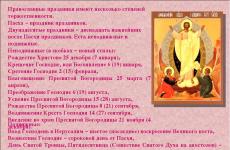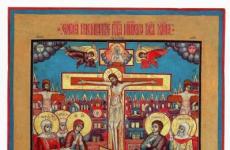Institute for Strategic Analysis of FBK. Igor Nikolaev, economist. The main directions of the Institute's work
- Decline in GDP at the end of the year - 3.7%. Could it be worse, or could it be worse?
– Our institute predicted up to minus 4%. But even this 3.7% is a very poor result. Suffice it to recall that the official GDP forecast for 2015, on the basis of which the federal budget was adopted, was plus 1.2%. This was later, of course, it was revised downward many times during the year.
– Could such a decline have been avoided and what should have been done to achieve this?
- It could have been avoided if the government had taken appropriate measures a few years ago. But when the economy is already weighed down by the burden of accumulated disproportions, it is difficult to change anything radically. I mean the imbalance in the raw materials and manufacturing sectors of the economy, public and private capital, social and public sector. Now, of course, certain actions can reduce the rate of this decline, but all the same, a crisis cannot be avoided. We are doomed to it precisely because too many problems have accumulated in the economy, everything is too neglected. In recent years, even high oil prices have not helped us. Suffice it to recall that the GDP growth rate in the first half of 2014 was 0.8%. Let me remind you that at that time a barrel of oil cost more than $100, there were no serious sectoral sanctions yet, but the economy actually did not grow. If at one time the government had carried out structural reforms, would have been able to get off the “oil needle”, to carry out a pension reform, if the share of small enterprises in our country was not 24% of all economic entities, as it is now, but at least 50%, then the current there would be no structural and, in fact, man-made crisis.
– What are the biggest risks the economy may face in the near future?
- The global risk is that the economic crisis may take a long, protracted nature. Two calendar years in crisis is already serious. But I would also highlight the risk of a decline in living standards, more significant than in 2015. Last year was the first in the 21st century when the real disposable income of the population went into negative territory. It is now clear that in 2016 the situation will be even worse.
- Everyone is concerned about the exchange rate of the ruble. How logical is what is happening to him? Perhaps the authorities should not let the ruble float freely, but, on the contrary, actively intervene in the situation in order, albeit artificially, to slow down the precipitous fall of the national currency?
- Here you just need to analyze the situation from the point of view of what factors predetermine the weakening of the ruble. Obviously, oil prices will remain low for the foreseeable future. Sanctions will not be lifted. World macroeconomic realities also do not bode well for us. The US Federal Reserve will continue its rate hike policy. There is no reception against scrap, except for another scrap, as they say. So, the authorities, the Central Bank do not have this other scrap. Yes, from the point of view of macroeconomics, certain opportunities remain. However, Russia has virtually no influence on oil prices, as well as on sanctions and the policy of the Fed. One could, of course, still resist, "burn" the gold and foreign exchange reserves, to put it in a fashionable word. For a certain period, this might have supported the ruble, but then it will certainly fall to an even lower point.
- And to what level can the ruble fall?
- The course has overcome the psychological barrier of 80 rubles per dollar. This is an anti-record, and it is obvious that the long-term downward trend will continue. It is predetermined by four main factors: the price of oil, macroeconomics, sanctions and the policy of the US Federal Reserve. In the medium term, they will not go anywhere. Higher oil prices will only help soften the situation and prevent a landslide. But macroeconomics will remain weak. With a weak economy, there cannot be a strong, strengthening ruble. Sanctions will not be lifted either, the Fed will raise rates. So there is virtually no limit to the fall of the ruble. But, according to our estimates, the average annual exchange rate of the ruble will be close to the current level - 80 - 80 with a little to the dollar. We do not share the forecasts that are now sounding that the dollar will cost 200 rubles or more. Another thing is that the ruble will weaken further, including next year.
– Are there any drivers for the growth of the Russian economy now, or are all hopes connected solely with the fact that oil will sooner or later start to rise in price again?
- According to the government's plan, as I understand it, import substitution should have become such a driver. It worked in certain industries, but the problem is that there are very few such industries. This is a chemical, food, pharmaceutical industry. That's it, essentially. Someone in this situation feels very well, but in general the economy was not ready for import substitution. If you look at, say, the pharmaceutical industry with its successful experience of competitiveness, then a sufficient number of projects with the participation of foreign capital were implemented there, certain requirements for the localization of production were observed there. Therefore, in the sectoral context, there is something positive. But this is a drop in the ocean. I repeat: structural reforms are needed. Of course, they will not save us immediately, but at least they will give hope that in four years the economy will move to sustainable growth. Otherwise, we will be bogged down in a crisis for many years.
- What should an average Russian do now in the consumer market - save money, save it, spend it on purchases, buy foreign currency?
– Well, do not forget that no one has canceled the ruble as a national currency and is not going to cancel it. Of course, it is wrong to sell the last rubles on dollars and euros, especially during a period of significant devaluation. On the other hand, if you have stable ruble income, if you have already bought everything you wanted, and if you have enough funds for savings, then in such a situation it is worth buying foreign currency. Surely you will win, because the trend towards the weakening of the ruble will continue, apparently, for a long time.
Institute management:
Director- Andrey Ilyich Fursov, Academician of the International Academy of Sciences (Innsbruck, Austria).
Deputy Director- Ponomareva Elena Georgievna, Doctor of Political Sciences.
Special project manager c - Fursov Kirill Andreevich, Candidate of Historical Sciences.
The activities of the Institute reflect the changes taking place in the world science of society. In the last 10-15 years, the following shifts have been clearly outlined in the socio-historical research field and the educational field, which is somewhat lagging behind it:
1. The narrow regional approach gives way to:
a) regional (sometimes macro-regional), the basic objects of research are not individual countries, but large complexes of production and exchange, what F. Braudel once called world-economy; these are, for example, the North Atlantic, the Indian Ocean zone (al-Hind), East Asian, the Mediterranean (with the southern, Arab, part), steppe Eurasia;
b) comparative historical (and most often in the long-term historical perspective): Western Europe - Russia, China - Japan; India - China; Western Europe - China; etc. Comparative analysis "West - East - Russia" is developing especially actively in the field of economic history;
c) analysis of certain large country (USA, China, India), imperial (British Empire) or regional (Middle East, Southeast Asia) complexes as elements of the world system; we are talking about such scientific programs as "world-system analysis" of the school of I. Wallerstein, "world-historical approach" (school at the University of Hawaii), etc.; all together it can be presented as historical globalistics.
2. The logic of the development of the modern world shifts the focus of research to the problems of modern (XX-XXI centuries) and new (from the 16th - early 20th centuries) history. This does not mean that antiquity and the Middle Ages are neglected. However, the priorities are set unambiguously (this is very clearly seen in the scientific and information flow).
3. For the last decade in the development of socio-historical science in the West, a return of interest in theoretical problems, especially in its Marxist versions, is clearly visible. The period of the 1980-1990s differed from the previous 30 years in the development of socio-historical science in that theoretical discussions, which were so stormy in the 1950s-1970s, practically disappeared.
Temporal detheoretization was associated with the neoliberal (counter)revolution and the empiricism characteristic of neoliberal economic schemes, which also influenced non-economic disciplines. Today the situation is changing in favor of a new round of theory development, pseudo-scientific schemes such as the “clash of civilizations”, the liberal “end of history”, etc., are becoming a thing of the past.
The main areas of work of the Institute:
- methodology of socio-historical research;
- the study of complex social systems (special attention - capitalist), including a comparative historical analysis of systems (systemology, comparative studies;
- study of systemic and transsystemic subjects (religious-political, financial, etc. corporations - order, neo-order, network structures, etc.);
- analysis of the real mechanisms of the global struggle for power, information and resources (conspiracy theories);
- analysis of global processes (globalistics);
- analysis of processes (including current history) in the main macro-regions of the world (Russia; Anglosphere; Germanosphere; Europe - North, South, East; Arab world; Middle East; Central Asia; South Asia; Southeast Asia; East Asia; Africa south of Sahara, Latin America);
- study of the contemporary ideological situation, ideological and psychohistorical struggle.
The Institute carries out
- research and information and analytical activities;
- advising legal entities and individuals on the subject of the institute's activities;
- implementation of design studies on the subject of the institute's activities by order of legal entities and individuals;
- holding seminars, round tables, conferences, webinars, etc. at the Russian and international levels. on research issues of the Institute;
- conducting unlicensed educational activities carried out by conducting one-time classes of various types (lectures, seminars), not accompanied by final certification and the issuance of documents on education.
Contacts:
Legal address: Russian Federation, 111398, Moscow, st. Kuskovskaya, 16
Postal address: 117418, Moscow, PO Box 7, ISAN.
Email: [email protected]
And director of the FBK Institute for Strategic Analysis. Freelance Advisor to the Vice Chairman .
http://www.fbk.ru/company/topmanagement/5006/
Education
- 1984 im. M.V. Lomonosov, teacher of political economy, economist
- 1996 Doctor of Economics
Economist Igor Nikolaev has extensive experience in strategic consulting (macroeconomics, budget and investment policy, structural reforms) and teaching experience.
Igor Nikolaev about published more than 350 papers in scientific and business publications on economic topics. Edited by I.A. Nikolaev published, among other things, such books as “How Much Russia Costs” (2004) and “Strategic Analysis. Collection of FBK reports” (2006).
IGOR NIKOLAEV - What will happen to the ruble?
Career of economist Igor Nikolaev
Since June 2013, he has been the head of the FBK Institute for Strategic Analysis.
From 2000 - present time. FBK LLC, Director of the Strategic Analysis Department.
From 1998 to 2000 - Ministry of Railways of Russia. Deputy Head of the Department of Economics.
Since 1997 he has lectured at the Higher School of Economics.
From 1997 to 1998 - Apparatus of the Government of the Russian Federation. Advisor.
From 1992 to 1996 - Ministry of Science of Russia. Head of the Department for Analysis, Forecasting and Priorities of Scientific and Technical Development, Deputy Head of the Department of Economic and Legal Regulation of the Scientific and Technical Progress.
From 1990 to 1992 State Committee of Russia for Science and Higher Education. Head of the Economic and Methodological Department.
From 1986 to 1990 - Moscow State University. M.V. Lomonosov. Faculty of Economics, Department of Industrial Economics, researcher.
Awards
In 2006, for merits in strengthening cooperation with the Accounts Chamber of the Russian Federation and a great contribution to the development of the state financial control system, he was awarded the distinction "For merits in strengthening cooperation with the Accounts Chamber of the Russian Federation."
In 2009 he was awarded the Diploma of the International Development Fund "Eurasia" in the special nomination "For the unique economic study of Russia's potential."
In 2013, he was awarded the Badge of Honor of the Russian Risk Management Society "For personal contribution to the development of risk management in Russia" .
Blogs Nikolaev Igor
- https://vk.com/club96532509
- http://www.site/users/160139/posts
- http://echo.msk.ru/blog/nikolaev_i/
- http://polit.pro/board/1-1-0-90
In recent weeks, there have been more and more statements from high tribunes that the economy has reached the bottom, and further we are expected to grow, albeit slowly. Economic Development Minister Alexei Ulyukaev, his deputy Alexei Vedev, and Deputy Finance Minister Maxim Oreshkin speak about this. Analysts of the Central Bank write about the stabilization of the financial market. Finally, the president of the country, at a meeting with members of the government, claims that the worst days for the domestic economy are over. Whether this is so, we decided to discuss with the Director of the FBK Institute for Strategic Analysis, Doctor of Economics, Professor of the Higher School of Economics Igor Nikolaev.
— So, Igor Alekseevich, are the high-ranking officials of the economic bloc of the government right in asserting that the bottom of the crisis has already been reached and it will be better in the future?
We have indeed heard quite a few such statements. That it is necessary to move on to the development agenda, that there is no crisis, that only growth will continue. The question is when will this growth start? The timing of its onset is shifted and shifted - it seems, to infinity. Officials operate on the latest monthly data on GDP: September to August, when there was an increase of 0.3%. They are prepared by the Ministry of Economic Development. But it is not for nothing that Rosstat does not give anything of the kind - it does not have statistics on the dynamics of monthly GDP, it is quarterly or annual, which complies with international statistical rules. Monthly data are very unreliable in this regard, they are purely estimates. It is impossible to take them as a basis and say that we have already begun to grow. In general, there is no clear improvement in the situation.
— Well, what are the prospects - tomorrow will be better than yesterday?
- Unfortunately no. At the end of the year, we expect deterioration in performance. Not only because oil prices remain low and sanctions continue to apply. There is also a base effect, although this reason may seem formal. The end of last year turned out to be very good in terms of the main types of economic activity - in industry, in trade. In December, the growth of industrial production amounted to 3.9%, retail trade in general rose by 5.1%, and trade in non-food products - by 10.7%. If you remember, there was a consumer boom, people tried to save their depreciating rubles before our eyes by investing them in purchases. Now we will compare the November and December macroeconomic parameters with that "productive" November-December, and therefore their growth is impossible, taking into account the base effect. In addition, the fundamental factors that gave rise to the crisis have not disappeared - the imbalance of the raw materials and manufacturing sectors of the economy, public and private capital, social and budgetary spheres. Therefore, I believe that official estimates are overly optimistic.
— Well, what about another optimistic argument of the Ministry of Finance: for the first time in several years, in the third quarter of this year, there was not an outflow, but an inflow of capital?
- Indeed, the inflow of capital was formally recorded. But here it is fundamentally important to understand what we are talking about. The funds come that entrepreneurs are forced to return from abroad so that their business does not collapse, since it is difficult or impossible to find money on the domestic market. This does not mean that investors ran to us again.

— What are the main negative factors affecting the economy and the main risks?
- This is still an extremely high dependence of the national currency on the price of oil. There is a significant risk that oil prices will go below $40 a barrel, and in the very near future. In addition, after the release of the latest data on the US labor market, the likelihood that the Federal Reserve will raise rates in December has significantly increased. This means that stock players will redirect their funds from oil to dollar assets.
Plus, at the beginning of next year, Iran should enter the oil market, further increasing its supply on the market.
The second, but, in my opinion, the most important problem: in Russia, no progress is yet visible in correcting the disproportions and structural distortions that have developed in the economy, which I spoke about above. When these distortions and disproportions remain, the crisis takes on a protracted character—at least four to five years. At the same time, the main risks for the economy will arise after 2016, when almost all the funds of the Reserve Fund and the National Wealth Fund will be spent.
— To what extent can the authorities be blamed for the current decline in the economy, and to what extent external circumstances, including geopolitical ones?
- The answer to this question is quite simple. We need to look at what was happening with the economy before powerful external negative factors turned on in mid-2014 — first international sanctions, then the fall in oil prices. In the first half of last year, oil prices, let me remind you, exceeded $100 per barrel, there were no serious sectoral sanctions, only personal sanctions against certain Russian officials.
Despite this, in the first half of the year, GDP grew by only 0.8% compared to the first half of 2013. The economy has already stagnated. That is, we would have entered the crisis without external shocks.
Another thing is that the shocks that followed aggravated the situation. But this is an additional effect, not the main one. All structural disproportions are just the result of an incorrect, inefficient economic policy, untimely decisions.
— With what macroeconomic results will Russia approach the end of 2015?
— A year ago, our institute predicted a fall in GDP in 2015 ranging from -2 to -4%. The Ministry of Economic Development then gave a figure of +1.2%, and then during the year it was corrected downward six times. We have never revised our forecast. And now we expect -4%.
In terms of inflation, when the budget for 2015 was adopted a year ago, the official forecast was 5.5%. Our estimate from a year ago - 12-14% - turned out to be a 100% hit. By the end of December it will be 14%, maybe a little more.
Now about the ruble exchange rate. The average annual rate in fact will be about 60 rubles per dollar. And in this we were not mistaken. Officially, a year ago, the figure was 37.7, which the authorities then also had to adjust many times.
As for the budget deficit, by the end of this year it will be relatively small - maybe within 1-1.5%. It will be much harder to make ends meet in the budget in a year - for 2016, let me remind you, there is a deficit of 3%.
— What are the main macroeconomic risks in 2016?
— The economic downturn is starting to be conserved — that's the main risk. If you do not take the necessary measures in time, the crisis becomes protracted. Getting out of this situation is much more difficult. We are again in the red and again eating up the last reserves.
— What do you think the authorities should do to bring the country out of the crisis and ensure economic growth?
It's hard to give a short answer here. It is necessary that the authorities finally understand what they are dealing with. Stop repeating like a mantra: "This is a structural crisis." That's right, structural. Then let them name the structural imbalances and suggest ways to resolve them. It is not clear what they are hoping for by including 0.7% GDP growth in the draft budget for 2016. I tried in vain to understand where this figure came from, what caused it. I heard, in particular, the following explanation: "Due to the increase in reserves."
But then the question arises: what kind of reserves and why will they suddenly grow?
Let's start with the simplest thing - lift the anti-sanctions. The Ministry of Economy and the Central Bank actually admitted that they do more harm than good, primarily from the point of view of unwinding inflation. The authorities want sanctions to be lifted from Russia. Why then was it decided in August to extend the anti-sanctions for a year?
And then we can reconsider the priorities of the federal budget, which has a clearly anti-social orientation: we cannot now afford to spend colossal funds on defense. And I am sure: we need to unfreeze the funded part of the pension. And taxes should not be increased, but reduced - this will help to revitalize business and, in the end, economic growth.






